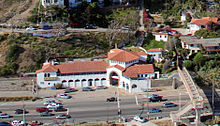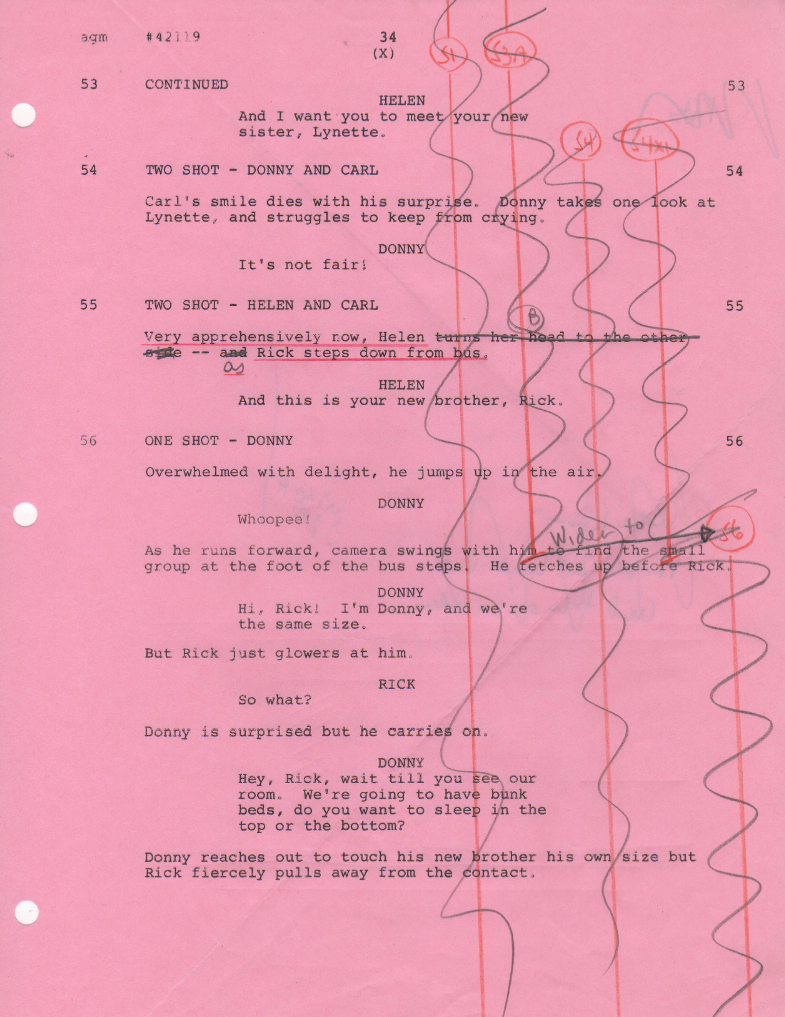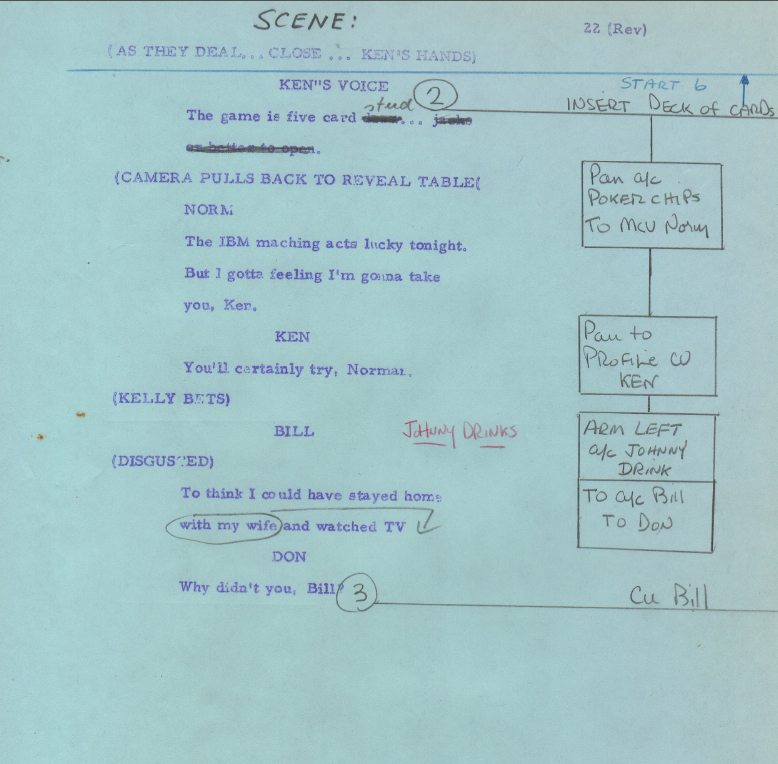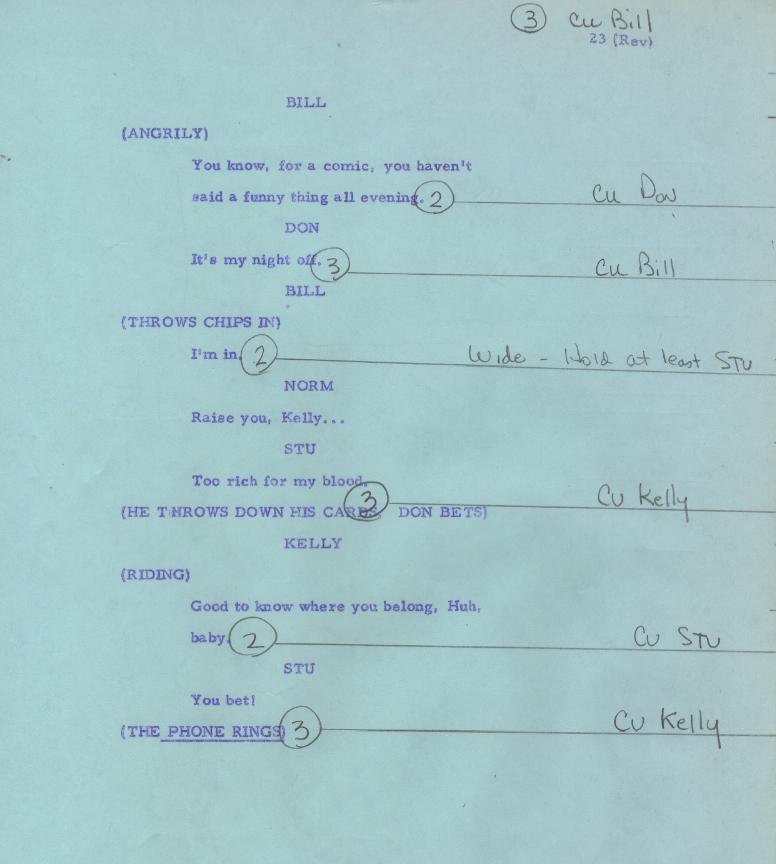TAPED May 1969
“There isn’t another show on television that could afford this cast.”
I think it was Peter Haskell who said that as the cast assembled around the rehearsal table for the first reading of THE POKER GAME.
Seated at the table in addition to Peter and the other three actors listed in the opening credits were Ed Asner, Don Dubbins and Booker Bradshaw. That rehearsal table was in the Paulist Productions headquarters in a building that figures in one of Hollywood’s great unsolved mysteries: the death nearby in 1935 of Thelma Todd.

Suicide or Murder? It was and is a sprawling, three-tiered Spanish-style building that in the 1930s housed the popular Thelma Todd’s Sidewalk Café on the ground floor, a private nightclub named Joya’s one floor up and Todd’s swank ocean-view apartment on the top floor. The building, overlooking the Pacific Coast Highway and Pacific Ocean, was inherited in 1952 by actress Lola Lane, the oldest of the Lane sisters who starred in the Warner Bros. classic film, FOUR DAUGHTERS. Miss Lane, a converted Catholic and a fan of Fr Kieser, invited him to use the ground floor for his INSIGHT productions offices.
Although INSIGHT was a weekly anthology series, produced in Los Angeles by Paulist Productions, it wasn’t primarily a religious-themed program. The series was created by Roman Catholic priest Ellwood E. “Bud” Kieser to blend his religious commitment with a passion for making socially aware films and television. Six foot six Fr Kieser was a member of the Paulist Fathers, an evangelistic Catholic order of priests,
I directed my first INSIGHT in 1967. My friend, Lily LaCava, a wonderful script supervisor, was contributing her services to the series that spring and had recommended me to Fr Kieser. For me it was a chance to complete some unfinished business. I had spent four years in the television division of CBS on the production staff of PLAYHOUSE 90 and, after it folded as the assistant producer on the daytime soap opera, FULL CIRCLE without getting a chance to sit in the director’s chair. In the spring of 1969 (INSIGHT always filmed in the spring during the regular television production hiatus) I volunteered to direct three shows for Father Kieser. THE POKER GAME was the second of the trio.
There was a major difference between directing film and directing live on tape. If THE POKER GAME had been a half-hour episode in a television series, I would have reported for three days of preparation and then three days of filming. With one camera I would have filmed the many setups, and then the film would have been turned over to a film editor to be assembled. A typical page in my director’s script would have looked like this:

For THE POKER GAME I reported on the first day as described above to the Paulist Productions offices in Pacific Palisades for a reading of the script by the cast. The next two and a half days were spent in one of the three large rehearsal halls at CBS Television City, where we rehearsed as we would for a stage production – there was no set, the outline of the set was tape marks on the floor. Afternoon of that third day of rehearsal we moved down to Studio 31, my old home turf where PLAYHOUSE 90 had been performed. There in our actual set we walked through the entire play with the three cameramen in attendance, as I outlined for them what their shots would be. You see we would be taping with three cameras, and I would be editing the tape as we shot. My script looked like this:


Early in the rehearsal period Jeffrey Hunter apologized to me. He said he had had an on-set accident while filming and that his memory was impaired. He was concerned he would not be able to remember lines. I assured him that I didn’t feel there would be any problem, and there wasn’t. Jeffrey’s is truly an unusual movie career. In 1950, while a graduate student at UCLA, he was spotted by talent scouts when he appeared in a college play. At the age of 24 he was put under contract by 20th Century Fox Studio and soon became one of the studio’s leading young stars. At the age of 29 he was loaned out to co-star in the John Wayne classic directed by John Ford, THE SEARCHERS. Five years later, with John Ford’s endorsement, Nicholas Ray cast him as Jesus in KING OF KINGS. It is only recently that I have learned from Marc Cushman’s magnificent book, THESE ARE THE VOYAGES, the whole story behind one of the most unfortunate career decisions in show business history. In 1964 Jeffrey starred as the captain of the Enterprise in a pilot for STAR TREK, a new television series. As reported by Cushman, NBC executives were blown away at the first screening. They had never seen anything with the scope of that production in a series for television. But they rejected it. The following year NBC did an unprecedented thing – they ordered a second pilot for STAR TREK. Jeffrey Hunter turned down the offer to star in it. As reported by Cushman it was Jeffrey’s second wife who came to the meeting with the STAR TREK producers and delivered that decision. She said Jeffrey was a movie star, not a television star. It was in the intervening years between then and INSIGHT that Jeffrey had the on-set accident. His employment during those years sank to appearances in television and low budget European films. We taped THE POKER GAME on May 2, 1969. Twenty-seven days later on May 29, 1969, Jeffrey Hunter died. He was only 42.
There are eight million stories in Hollywood. Jeffrey Hunter’s is one of them.
That was my first and only time working with Beau Bridges. We knew when we signed him that we would have to lose him for a half-a-day’s rehearsal. He needed to go to court in downtown Los Angeles to finalize the adoption of Casey Bridges, his oldest son. I had worked with father Lloyd Bridges (and would work again with him in the future). I never worked with Jeff Bridges. I like to say that Jeff is the only Bridges I didn’t cross.
I have trouble arriving at the reasoning at the upper echelons of the three networks that resulted in the abolishing of the anthology format from their schedules. Disappearing were the successful classics TWILIGHT ZONE, SUSPENSE THEATRE, CHRYSLER THEATRE, THE OUTER LIMITS, THRILLER, ALFRED HITCHCOCK PRESENTS.
Beyond the opportunity to work in the live-on-tape process, I relished the opportunity afforded by the anthology format of INSIGHT. Where else could I find a script that in 29 minutes openly dealt with the problems so present at that table in THE POKER GAME? The frank racism during the jocular jesting, including the uttering of the “N” word! The open parental hostility to the “hippie”, now over four decades later an archaic reference, but oh, so relevant at the time! Ed Asner’s disdain for his Jewish father — “mashugena”! The use of sex and the bottle by the two characters as their escape from the reality of living! INSIIGHT was indeed an oasis!



Another fabulous article Mr. Sensensky. I must confess that I was prejudiced towards “Insight.” Since it was produced by a religious organization, I assumed that their shows would be pedantic right-winged stories that stridently reinforced the Christian doctrine. Based off your description of the episode, it sounds like I was dead wrong. It sounds like a fairly gritty and highly engaging episode. I guess I’ll have to check it out. Thanks for the memories.
Wow… I remember this show from when I was a little kid. They used to run it early mornings before or after “Davy and Goliath” back in the early 70’s. They were still running it when I got older in the late 70’s. I always wondered what had happened to this show. I remember even as a little kid, being pretty amazed at how many big name actors appeared on it. Thanks for putting this up. It was pretty cool to see again.
It’s so exciting to get a look at this wonderful series again. What an extraordinary cast, not to mention your insights and the backstory. I met Father Kieser once on an elevator. I don’t remember where it was or why, but I do remember how gracious he was. These episodes are very hard to find. I’ve been looking for the one with Paul Richards in my research, “Brothers in the Dark” from 1964, but no such luck. Thank you for posting!
Hi Karen: I think you can secure copies today from Paulist Productions at: http://www.paulistproductions.org/insight.html
Thank you! I will give them a try. All the best in 2014 for you.
I never heard of ‘Insight’ until the early ‘80s…in the wee hours of one morning, I stumbled across an episode that starred Harvey Korman. I don’t remember any laughs…it was dead serious. Harvey also looked younger than I expected…upon further research, the episode was taped in 1974.
Ralph, when you say “editing the tape as we shot”, what does that mean for us civilians? I’m guessing you were in a control room watching the feeds from the three cameras on monitors and calling the shots from there…or were you on the soundstage with the actors? Also, did ‘Insight’ give the director input on casting decisions like a “normal” show? Lastly, did you direct Fr. Kieser’s monologue?
Fans of Jeffrey Hunter should check out a tribute website called http://www.jeffreyhunter.net. It has a lot of articles, pictures, and video links.
Paulist Productions is on Facebook. From there I learned that UCLA did a 50th anniversary program for ‘Insight’ in 2011. It included the showing of two episodes, “The Poker Game” (B&W version) and 1965’s “Locusts Have No King”, which starred William Shatner and was directed by Ted Post.
I’ll be answering your question about “editing the tapes as we shot” shortly in my next post. To answer further questions, I worked with the casting director on INSIGHT just as I did on “normal” shows. And no, I did not direct Fr Kieser’s monologue. They were written and taped AFTER post production was completed.
Stores like these enable you to acquire issues in bulk.
Ralph, thank you for sharing your memories of Jeffrey Hunter.
His story is such a sad one and like you said, he passed away long before it was his time.
But I would like to add that even though he was a very engaging and good actor,
I think his more brooding characterization of Captain Pike would not have worked
had he gone to series as the Captain. Shatner’s injection of energy and humor
really gave contrast to Leonard Nimoy’s performance as Spock.
Sadly, we’ll never know what potential Hunter could have reached as Capt. Pike
Ralph, I’m not sure if you’re aware of this but Paulist Productions has started releasing episodes of Insight on YouTube. Currently they have over 100 episodes on their YouTube channel including “The Whole Damn Human Race and One More” (1970) and “Prince In Apple Town” (1969). They just posted “The Poker Game”. Hopefully a new generation will be inspired by this truly memorable series. There will never be another one like it.
Thank you Mike. I didn’t know. I have just watched PRINCE IN APPLE TOWN. It has not been included as one of my posts because years ago when I purchased tape versions of the show, they did not have a copy of PRINCE available. I have not seen this show since it first aired decades ago. I was impressed and moved. I so agree with everything you have written. I urge anyone who reads this to visit INSIGHT on YouTube at: https://www.youtube.com/results?search_query=paulist+productions+insight+
Ralph, I rather enjoyed watching this in its entirety on You Tube (and what a great cast!). I do question the use of the library music used in the underscore, which I think detracts from the drama (no music, IMO, would have worked better). Of course, I understand that, unlike a feature director, a director for episodic drama, especially in those days, was usually on to his/her next assignment by the time a certain project was in post production. This said, how did you (generally) feel about the scoring of episodes you directed (that is, when you finally saw them broadcast)? I recall you making favorable mention of George Duning’s music for “Metamorphosis” (and rightly so, because that score is exquisite), but were there those occasions you thought the music score for one of your directed productions was out of place or just “tonal-y wrong?”
Interesting question William. In addition to my own previous music training, I had what I realize was a private course in movie background music. During the 8 months I was the assistant to the producer on DR. KILDARE, I had the opportunity to sit with Harry Sukman as he plotted and planned scores for the episodes he was assigned. Harry was an Academy award winner. I learned from him that music should NOT be added if a scene was working. As you noted, the music process for television series was done in post-production after the director had left. I don’t remember the film scores (and I think there might have only been a few) that might have irked me. I do remember the KILDARES I did with Sukman, where I got to sit with him as he planned.